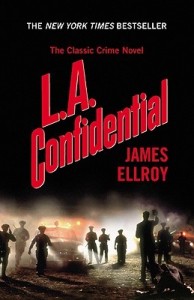 Watching L.A. Confidential again last night, I started to reflect on my long history with James Ellroy. I was young when I first started reading him—maybe eleven or twelve—and The Black Dahlia was not my first of his books. When I started with Clandestine or Brown’s Requiem, the noir voice had me, a girl who had grown up on the movie The Big Sleep but never read Raymond Chandler, hooked. The Black Dahlia was the second book of his that I read and as a burgeoning woman, I wanted to be as beautiful and as desired as Betty Short. I was young enough and immortal enough that the extreme violence committed against her didn’t even phase me. Even after reading L.A. Confidential and several other books, I didn’t key into it or how it might be affecting me.
Watching L.A. Confidential again last night, I started to reflect on my long history with James Ellroy. I was young when I first started reading him—maybe eleven or twelve—and The Black Dahlia was not my first of his books. When I started with Clandestine or Brown’s Requiem, the noir voice had me, a girl who had grown up on the movie The Big Sleep but never read Raymond Chandler, hooked. The Black Dahlia was the second book of his that I read and as a burgeoning woman, I wanted to be as beautiful and as desired as Betty Short. I was young enough and immortal enough that the extreme violence committed against her didn’t even phase me. Even after reading L.A. Confidential and several other books, I didn’t key into it or how it might be affecting me.If you know anything about Ellroy, you know that his mother was brutally murdered and that his books, especially those early ones, are places where he is dealing with that trauma. Elizabeth Short’s death was not dissimilar to his mother’s and there is often at least one Bud White in each early James Ellroy novel trying to save the girl—any girl—from harm. I believe that the resulting works show a respect for women, even if it borders on unhealthy worship.
I was still very young and unsettled when I watched the premiere of L.A. Confidential in 1997 at SIFF. I still wanted to be one of the women that the foul-mouthed writer would worship, and I still thought murder, even brutal serial killer style murder, was interesting enough to take Bob Keppel’s class on Ted Bundy.
In the last few years, maybe as I’ve begun to see myself more as a mortal person not merely a sexual object, I’ve started to wonder about the sexual violence against women we expose ourselves to through various media. I used to enjoy Criminal Minds, but now I realize that (despite some smart detectives) the stories are populated with women as victims and the violence is often heinous and sexual. The last few years, the torture rape filled horror movies have ruined for me one of my favorite film genres. The only conversations I can have about The Girl with the Dragon Tattoo are about whether the sexual violence is for titillation and I’m still not convinced it isn’t.
Violence happens. I’m headed to Croatia soon and one of the things I can’t get out of my mind is the rape camps of the Bosnian War and that we can barely talk about it still. Humans are animals and at times that is far too evident. I don’t think we should ignore it, but I also don’t think we should normalize it. At the same time, it can be interesting to learn about those uncontrolled parts of ourselves.
I try not to read about rape (no more Stieg Larsson for me and I’ll skip The Kite Runner, thank you). I did write about rape in Polska, 1994 because I wanted to try to understand it. I’m glad I did, because through writing about Magda’s victimization, I was able to see myself as a whole person (rather than a victim) with power in my actions. My fear is that for many people scenes of sexual violence and torture are becoming sources of excitement rather than cautionary and we are teaching our children that women are victims not people. Even James Ellroy saw women as victim-objects to be saved.
I don’t have any answers, but the long-lasting effects of the victimization of women in media is something I will continue to think about.
If this review made you want to read the book, pick up a copy of L.A. Confidential from Bookshop.org. Your purchase keeps indie booksellers in business and I receive a commission.
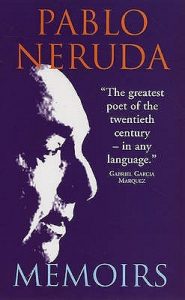 Pablo Neruda had a fascinating life and met all sorts of interesting people from Che Guevara to Federico García Lorca. But in reading his Memoirs, I felt like he was recounting all of these stories to me as opposed to letting me relive them with him. Although Neruda uses some dialogue, he rarely ventures into full-blown scene. The closest he gets are little vignettes like:
Pablo Neruda had a fascinating life and met all sorts of interesting people from Che Guevara to Federico García Lorca. But in reading his Memoirs, I felt like he was recounting all of these stories to me as opposed to letting me relive them with him. Although Neruda uses some dialogue, he rarely ventures into full-blown scene. The closest he gets are little vignettes like: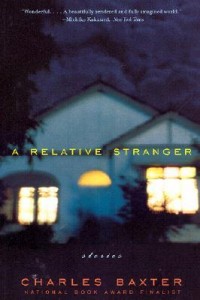
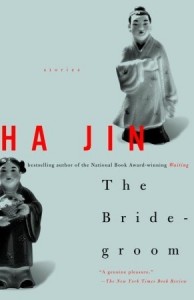 In Ha Jin’s collection of stories, The Bridegroom, the protagonists are powerless to effect any real change in their circumstance. At best they can hope for vengeance by spreading disease or peeing on purslanes. Ha creates this feeling of constraint and hopelessness in “Saboteur” by tightly controlling his delivery of words.
In Ha Jin’s collection of stories, The Bridegroom, the protagonists are powerless to effect any real change in their circumstance. At best they can hope for vengeance by spreading disease or peeing on purslanes. Ha creates this feeling of constraint and hopelessness in “Saboteur” by tightly controlling his delivery of words.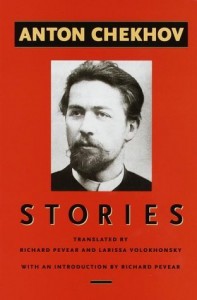 Chekhov names the nature of Olenka’s character early in the story in the following passage: “She was always fond of some one [sic], and could not exist without loving.” He then mentions some of the family members she has loved. But prior to this, her husband, Ivan Petrovitch Kukin, (aka Vanitchka) has had a large blowup about the vulgarity of the patrons of the story. I was drawn into the drama of Kukin and didn’t see this first clue, the subtle unfurling of Olenka’s personality. When she first parrots his opinion, “‘But do you suppose the public understands that?’” I thought we were seeing an action she would habitually take, but I didn’t yet realize this was the key to her nature. It isn’t until Chekhov revealed that the actors referred to her as “Vanitchka and I” that I got the point.
Chekhov names the nature of Olenka’s character early in the story in the following passage: “She was always fond of some one [sic], and could not exist without loving.” He then mentions some of the family members she has loved. But prior to this, her husband, Ivan Petrovitch Kukin, (aka Vanitchka) has had a large blowup about the vulgarity of the patrons of the story. I was drawn into the drama of Kukin and didn’t see this first clue, the subtle unfurling of Olenka’s personality. When she first parrots his opinion, “‘But do you suppose the public understands that?’” I thought we were seeing an action she would habitually take, but I didn’t yet realize this was the key to her nature. It isn’t until Chekhov revealed that the actors referred to her as “Vanitchka and I” that I got the point.